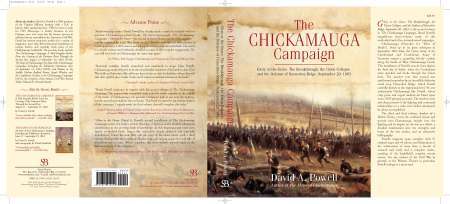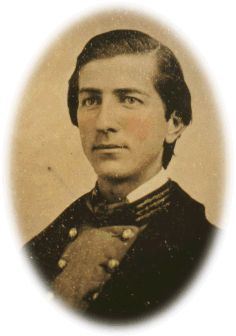Angry Generals
I time for a short excerpt:

Early on the morning of Sunday September 20, somewhere near smoldering remains of the Alexander cabin, Captain J. Frank Wheless found himself caught in the middle of what would be one of the most significant controversies of the war: The three-way train wreck of miscommunication between Confederate Generals Braxton Bragg, Leonidas Polk, and Daniel Harvey Hill.

Frank Wheless was a 24-year old from Clarksville, a combat veteran of the 1st Tennessee Infantry, now serving on Polk’s staff. When at dawn, Polk awoke and waited for the expected roar of D. H. Hill’s attack, he was greeted only by silence. Discovering that the previous night’s orders were never delivered, Polk immediately dispatched Wheless with replacement instructions.
Wheless soon found Hill, in company with both divisional commanders Patrick Cleburne and John C. Breckinridge. Wheless attempted to deliver his orders (made out to Cleburne and Breckinridge, because Polk thought Hill was missing.) Hill intercepted them. The captain would get no satisfaction from Hill, only an argument that an immediate attack was impossible now, the men had to eat.
The frustrated staffer rode away. He soon met his boss, Polk, along the Alexander Bridge Road.
[the following is excerpted from Glory or the Grave,]
“Wheless dutifully explained his discussion with Hill, doing little to hide his irritation with the North Carolinian. “General,” he burst out, “you notice General Hill says it will be an hour or so before he is ready to make the attack. I am confident that it will be more than two hours before he is ready.” This statement was recorded in an official declaration Wheless drafted just ten days after the battle. Polk “asked, with surprise, why I thought so. I answered, ‘General Hill seems to me perfectly indifferent.’ General Polk responded quickly and with decision. ‘Well, Sir. Well Sir. I must go and see to this myself.’” After Polk dictated a quick note to Bragg outlining Hill’s reasons for delay, the Bishop ordered Wheless to stay put, establishing Right Wing headquarters on the spot, and rode off to find Hill.”
“Not fifteen minutes later, Bragg rode up and demanded Polk’s whereabouts. Wheless explained all that had passed, outlining the previous night’s confusion. He also emphasized Hill’s delays, eager to deflect Bragg’s obvious anger away from Polk and toward Hill. Bragg wasn’t swayed. When Wheless repeated his story of the two-hour delay to the army commander, Bragg sarcastically inquired “how [Wheless] expected General Hill to make the attack before he received orders to do so.” Flustered, Wheless only made things worse by pointing out that when he (Wheless) left Bragg the night before he was under the impression that Bragg had going to issue orders to Hill in person, outlining the plans for the 20th. Polk’s orders, averred the captain, were only confirming instructions that were supposed to have been already given “so that there could not possibly be any mistake.”
“Wheless’s not-quite-so-subtle effort to shift blame away from the bishop and this time onto Bragg himself only deepened the army commander’s anger toward Polk and, by extension, Wheless. Sensing his blunder, Polk’s staff officer quickly changed tack, steering matters back to the subject of Hill’s recalcitrance. Here he stumbled again, however, by adding in the detail of Cleburne’s remark about the Federals felling trees. “‘Well sir, is this not another important reason why the attack should be made at once?’” snapped the incensed army commander. Wheless agreed; but, he rejoined, “‘it did not seem to impress General Hill in that way.’”
“Without another word Bragg rode on to find Polk and/or Hill, leaving the discomfited Wheless in his wake. By 7:30 a.m., the Confederate right was buzzing with angry generals, each surrounded by a sub-swarm of agitated staff officers. Despite the hive of activity and authority no attack was forthcoming.”
Wheless would later write out a sworn statement supporting his boss, Polk, as part of the defense Polk assembled for what all expected would be the court-martial of the century, at least as far as the Army of Tennessee was concerned. Polk, of course, never sat before such a court – President Davis talked Bragg out of holding a public spectacle and instead arranged for Polk to be transferred to Mississippi.
When I first wrote this passage, I wondered what was going through Wheless’s mind as he found himself in the middle of the maelstrom. His loyalty to Polk is obvious in his statement, as his his animosity towards Hill; but was he cowed by Bragg’s obvious short-tempered displeasure?
Apparently not. Instead, after Polk’s departure, Bragg offered Wheless a job on his own staff, as an assistant inspector-general. He was sent to Giffin, Georgia. In February, 1864, Frank Wheless resigned his commission, claiming disability for further field service, and instead entered the Confederate Navy as a paymaster, serving in North Carolina. Near the end of the war Wheless was transferred again, to the James River Squadron, where he was re-united with Bragg – once again, Bragg offered him an army commission as a Lieutenant Colonel, IG Branch.
Wheless refused that commission. The end of the war was apparent, and he saw no point in changing services a second time. At the end, Wheless helped evacuate the Confederate Treasury from Richmond, accompanying it, along with Davis and the rest of the fleeing Confederate Government, as far as Abbeville South Carolina. There he helped disburse the last of the funds to Davis’s cavalry escort, and having done all he could, left the service of the rapidly disintegrating Confederacy.
Frank Wheless died on August 10, 1891, at the age of only 52.
And I still wonder how often, in later years, his thoughts went back to that critical morning, when for a little while, the fate of the Confederacy seemed to be in his hands.


David A. Powell's Blog
- David A. Powell's profile
- 28 followers



